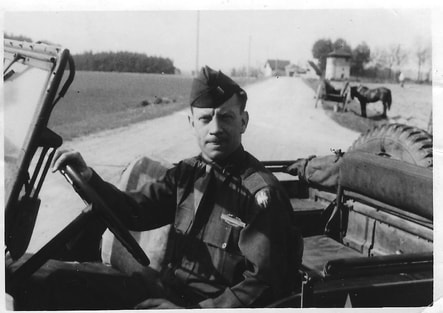 Lt. John C. Goodlett in Germany, 1946. Lt. John C. Goodlett in Germany, 1946. I’ve spent a good bit of time over the past two years reading about both World War I and World War II for two very different book projects. I have to confess, I’ve never been particularly interested in military history, but I have discovered, as many do, that it becomes fascinating when it’s filtered through the stories of family members. Unfortunately, I never had the chance to talk to either my father or my maternal grandfather about their experiences overseas. Of course, even if they had been around, it’s quite possible they would not have shared any information with me. That is true of many, many veterans. But I am glad that I now have at least a nominal understanding of where their service took them and what they faced. Although I missed honoring them publicly on Veterans Day November 11, I thought I could still write a few words before the month is out. Both men were sent to Europe near the end of their war, which meant both were in the midst of or in the vicinity of some of the most ferocious fighting. My father was an infantryman in Patton’s Third Army, one of the lieutenants who marched across Germany in spring 1945 and lived to tell about it. My grandfather was a radio operator in the Signal Corps during the first War, a replacement at the Meuse-Argonne offensive. The two wars—and the experiences of the Americans who served—were obviously very different. But the fact that two young men interrupted their lives and set aside their dreams to protect our freedoms and the interests of the United States is the same no matter the war, no matter the era. Today, every young man and woman who enlists makes the same sacrifice. Last week my cousin sent me a link to an interview conducted in 1980 that is part of The Witness to the Holocaust Project archived in the Special Collections of the Woodruff Library at Emory University. The man answering the questions is Captain John Henry Baker Jr., who commanded Company B of the 260th Infantry of the 65th Division of the Third Army. That was my father’s regiment, although I have not been able to confirm which company he was in. Captain Baker talks at length about his unit being one of the first to arrive at both Ohrdruf and Mauthausen concentration camps. If you have read The Last Resort, you have seen my father’s account of what he observed at one of these camps. (He does not name the camp in his letter home to his mother.) My father’s description and Captain Baker’s description align in nearly every grotesque detail. I did not have family exterminated at these camps. I cannot imagine the horror or the suffering of the imprisoned, although I have read Elie Wiesel’s account of his experience. But knowing that my own father witnessed the depravity of these camps first-hand makes me want to ensure that none of us ever forgets what happened there and why. Those who enlist to serve in our military deserve so much more than our respect, our support, our thanks. They most certainly deserve lifelong care for any physical, mental, or spiritual afflictions they bring home with them. But I have no idea how else to honor them—other than to continue to tell their stories.
0 Comments
Your comment will be posted after it is approved.
Leave a Reply. |
Details
Archives
June 2023
Categories
All
|


 RSS Feed
RSS Feed